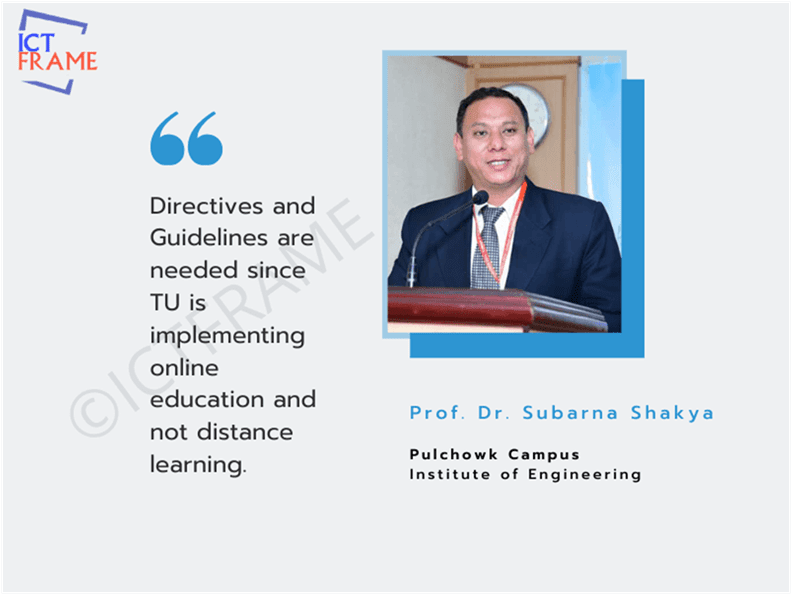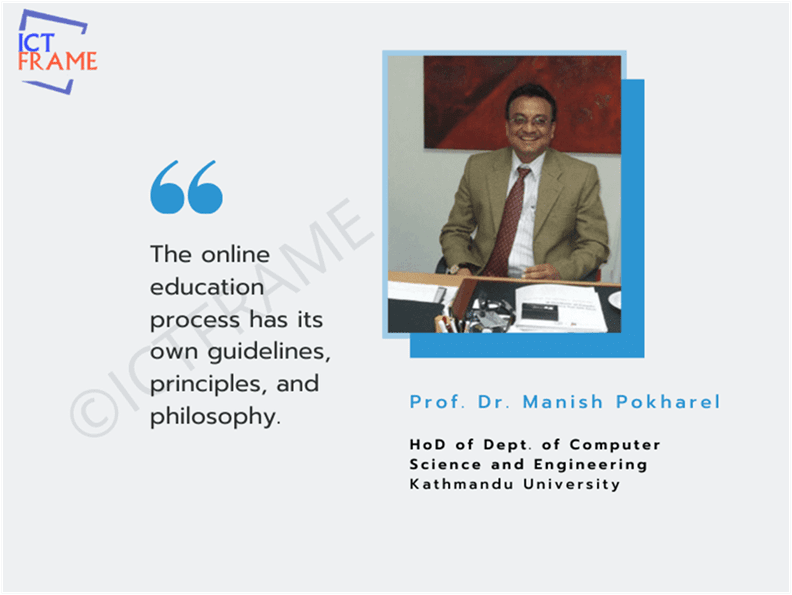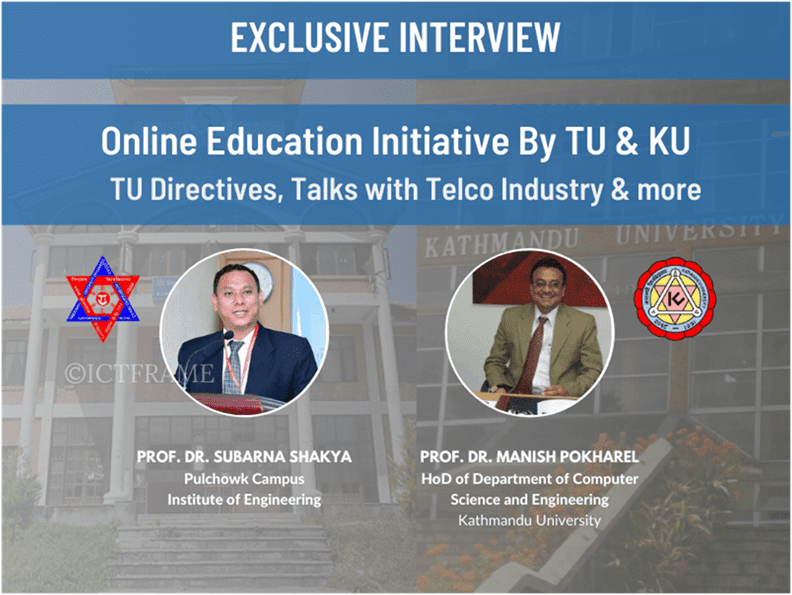Online Education Initiative By TU & KU | Talks with Telco Industry For Better Infrastructure
27 April Kathmandu, 2020
The risks of COVID-19 has affected the educational sector and pushed it to adopt online platforms. With the future of more than 7.5 lakhs students at stake, colleges and universities have started conducting online classes through ICT.
According to the census of 2068 BS, 7.3% of households in Nepal have a computer and 65% have mobile phones. In fact, a recent Nepal Media Survey concluded 96% of mobile phones facility in Nepali households. Out of this, 61% of them use smartphones. (Stats from a survey conducted by Sharecast Initiative Nepal)
Just look at that rise in the statistics! This means there is a huge possibility of online education in Nepal.
Most educational institutes are using platforms such as Microsoft Teams, Google Meet, Zoom, etc. Among the universities, Tribhuvan University (TU) recently gave the green signal for conducting online classes with certain directives/guidelines. Kathmandu University (KU) is also planning to come up with a complete online education solution.
You May Also Like: Tribhuvan University Issued Guidelines For Teaching Through Online Classes
We interviewed Professors from the two Universities to get more ideas. Let’s find out what two of the most prestigious Universities of Nepal are planning.
Interview with Dr. Subarna Shakya – Professor, Pulchowk Campus, Institute of Engineering
Q. How is the Pulchowk Campus conducting online classes are what platforms are lecturers using?
A: In the Department of Computer Science, we are using Zoom while the School of Management is using Microsoft Teams. Also, the attendance of students has increased as compared to regular classes.
Q. Do we need to focus on the security aspects of online education immediately?
A: I believe that there is a little need for safety when it comes to educational content or notes. Knowledge is everywhere and it doesn’t matter who gets it because one of our responsibility is to provide knowledge. It is not a secret meeting where we discuss confidential information. Therefore, I believe there’s no immediate need for safety when it comes to knowledge sharing.
However, when it comes to materials and identity, security needs to be implemented. Considering the security of the platforms that we are using, Microsoft Teams is highly secure. And although there are some vulnerabilities with Zoom, I don’t think it will be a problem with the licensed version. So, educational institutes must use authentic and licensed products to maximize cybersecurity. No educational institute should just wing it and use just another product in the market.
In fact, it is extremely important for Universities to use licensed products avoiding any legal and moral issues.
Q. How active is the participation of students and lecturers during live online classes?
A: Well, the attendance rate is higher in online classes. I believe the reason behind this is the convenience and mitigation of other affecting factors. For instance, there are factors like transportation issues, traffic jams, etc. causing students to arrive late or not at all.
With online classes, it is obviously real-time and students need not go through any inconvenience to reach the college. There is knowledge sharing, interaction, and other tools involved except its not physical. The only problems I see are the connectivity issues of internet or mobile data and power outage.
Other than that, we are conducting classes according to the routine, and students are participating quite actively.

Q. What are the challenges of online education?
A: There are certainly a few challenges when it comes to virtual classes. Sometimes, there are connectivity issues and other times issues with sound. Similarly, some topics are easier explained on the whiteboard or in person.
Students were not used to virtual classes and some are still adapting to it. The experience is quite new and different for most and the interaction among students is not the same. However, this has completely discouraged students to talk unnecessarily and distract the class.
Q. What do you think about the recent directives or guidelines released by TU?
A: Yes, I read the notice but I am not in the committee which released it. However, it is a good initiative by TU to adopt online education. And, it is not to be confused with distance learning. As a matter of fact, it is just real-time learning through applications and tools.
The classes are conducted as per the schedule and students must attend the class. So, there is not much of a difference between taking physical classes and online classes. Thus, it needs certain guidelines since TU is neither a distance learning nor an open university.
In addition, we need to consider this as an opportunity to prepare for the future. At present, it is being used as a contingency for the COVID-19 pandemic. But, we need to prepare ourselves to blend online education in the education process in the future.
Q. What are your views on full-time teachers not being able to conduct online classes other than TU?
A: In my experience, it is the same in colleges and universities abroad as well. It is because the Professor or full-time teacher is hired for teaching and research at the university. And, in return, the university also has a responsibility of providing certain facilities to the professor.
So, I think due to these reasons TU had added this point in its directive. However, full-time teachers can make an appearance as a guest lecturer in other colleges or universities. And, if online classes are the future, then a better policy should be drafted for this decision since we can conduct 7-8 online classes in a day.
For instance, there are around 15 colleges under the Institute of Engineering. If I conduct my subject for these students and if students of other universities are interested to join, how do I say no? Therefore, I believe TU could introduce a better policy that would not keep students from getting knowledge.
Q. How is TU preparing online education for the long-term?
A: TU has formed a high-level committee to plan for online education for the long-term. The main topic of discussion is ‘how to develop the infrastructure of TU’. Actually, TU can’t improve its infrastructure overnight due to the requirement of resources and manpower. So, we are planning to use cloud-based service from a Service Provider to integrate online education.
Also, we need to get or buy licensed products to ensure security. Moreover, talks are going on with telco industries to ensure connectivity in remote areas of Nepal. We are currently discussing how to provide internet or data in those areas for students.
You May Also Like: How Are Colleges in Nepal Conducting Online Classes?
Interview with Dr. Manish Pokharel – HoD of Department of Computer Science and Engineering, Kathmandu University
Q. Has Kathmandu University started conducting online classes?
A: Currently, there is no full-fledged implementation of online classes in KU or its affiliated colleges. Some lecturers had already started conducting online classes through Zoom and Google Meet since the lockdown. But, a KU committee formed after the lockdown is discussing upon forming a policy for implementing online education.
For this, we will most probably be using Moodle. Moreover, we are still discussing the ways to customize the platform and prepare an effective Learning Management System.
Q. How is the attendance rate of students during live online classes?
A: I am also conducting live classes for students and my classes have 100% attendance. I believe the reason is the preference and familiarity of students with gadgets and devices. They are showing more interest in virtual classes than traditional physical classes.
The classes are real-time and students can interact with the teachers as well. They can see their fellow classmates and expressions of the teacher. Due to this, it’s not so different from regular classes and therefore, students seem to be enjoying it.
Q. What are the challenges of adopting online education in Nepal?
A: Most people have common misconceptions regarding online education. Firstly, people believe that it is the process of digitizing existing curriculums or coursework. I can assure you that it is not the case.
The online education process has its own guidelines, principles, and philosophy. Thus, I think people don’t yet have a good concept of it.
Currently, we are forced to shift our education process online due to the COVID-19 pandemic. But, a few institutions used to conduct online classes since the late 2000s. Due to the fact that most educational institutes are new to the concept, we are missing the tools and requirements for it.
Furthermore, we need to focus on upgrading our course module and faculty. Present students at the senior level (high school level) were born in a digital era. In order to teach these digital natives, we need to upgrade our education process.

Q. Why should colleges and universities select a safe and secure online platform?
A: There are certainly questions regarding the safety and security of online platforms. There are numerous cyber threats but, it doesn’t mean that we shouldn’t explore technologies. We need to address cybersecurity issues and data hacks for sure.
The only way out is to make sure we use secure platforms and address the challenges of security.
Q. How can we solve issues regarding the unavailability of the Internet in remote areas of Nepal?
A: A national-level problem like this one is usually dealt with by three parties. First is the concerning educational sector, second is the private sector, and third and most important is the government. So, we can solve this issue if all these parties work together and come up with a solution.
There are bodies like Nepal Telecommunications Authority (NTA), 11 Universities, and private organizations. They need to combine their strategies to provide better infrastructure in all 77 districts in Nepal. The infrastructure may include computational devices, network coverage, and other resources.
If a good policy is implemented then the digital divide in Nepal can come to an end. This pandemic is a good opportunity to do that.
In fact, I believe WiFi should be free for students. As long as we don’t prepare and provide such resources, there always is a chance of some students missing out. Better infrastructures are also needed to minimize disruption and distraction due to bad connectivity.
Final Words
Talking about the availability of the internet, 59% of people use the Internet from mobile phones while 34% have broadband and Wi-Fi services. The statistics support the shift toward online education. But, are we really ready?
The concept of e-learning and distance learning is still a new concept for most educational institutes. They might have started online education through several platforms as a response to the current scenario. However, there are matters of safety, security, and availability of resources.
It is the perfect opportunity for them to explore and seek expertise to implement a long-term solution. The pandemic might as well push most educational institutes to ICT in their curriculums. But, strong coordination from universities, the private sector, and the government is required.
Do you think online education will shape the future of the learning process in Nepal? Can we be prepared on time?
Let us know in the comments!
Related Articles
Fusemachines Launches AI-Enabled Classroom | Will AI Shape the Education Sector?
Online Classes Start in Samriddhi School For The New Academic Session 2077
Google Education Group Starts Training Schools For Online Education In Nepal
Teach From Home: Google Launches A Remote Learning Hub






